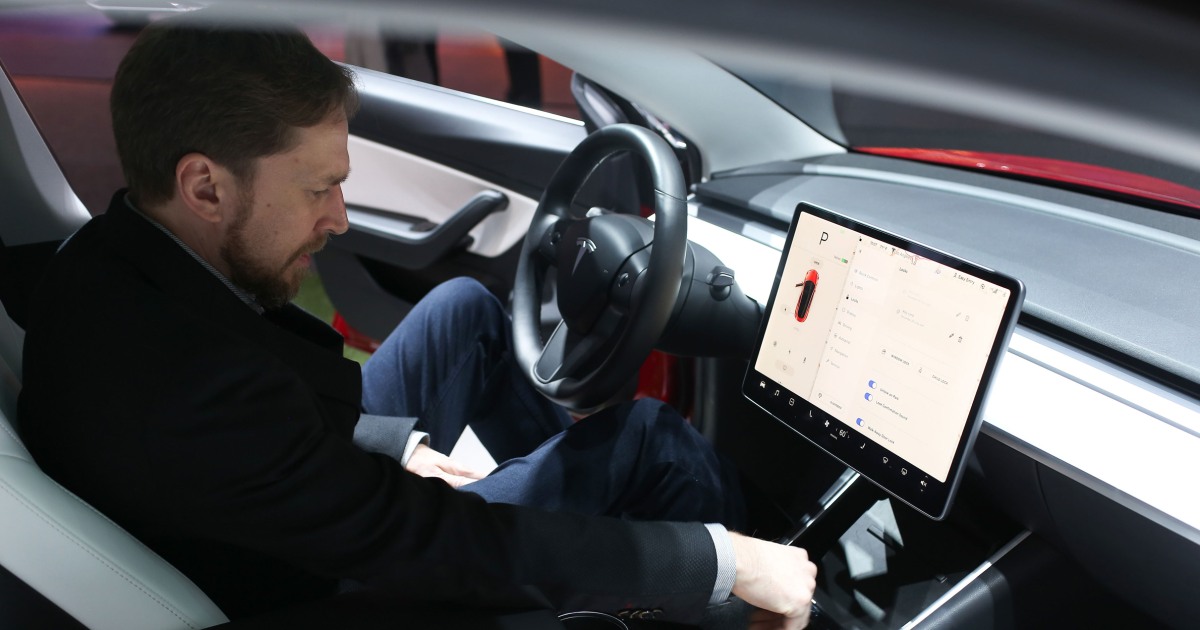
A recent over-the-air update pushed out by Tesla delivered an unexpected new feature — the ability for a motorist to play video games, even while driving — and that has raised the concerns of federal safety regulators.
It’s just the latest time that Tesla appears to have pushed the boundaries when it comes to safety, with the National Highway Traffic Safety Administration having repeatedly raised concerns about the automaker’s initial Autopilot system and more recent “Full Self-Driving” feature.
The latest controversy was triggered by a complaint filed by Vince Patton, a retired journalist living near Portland, Oregon, who watched a YouTube video showing how drivers could play video games on the large touchscreen that controls virtually all functions in Tesla vehicles. Taking his own Model 3 out, Patton found he could play games like Solitaire and “Sky Force Reloaded,” as he looped around a parking lot near his home.
“Somebody’s going to get killed,” Patton told the Associated Press after filing a complaint with NHTSA. “I was just dumbfounded.”
Tesla is no stranger to the federal safety agency, as well as the National Transportation Safety Board. Both agencies have repeatedly initiated safety probes, looking into issues including battery fires. But that scrutiny has only ramped up since 2015, when Tesla first made the Autopilot software available to drivers. It has been linked by regulators to several deaths and numerous crashes, notably a 2016 Florida incident that killed a former Navy SEAL.
In August, NHTSA began an investigation into the 11 crashes that have occurred in the U.S. since January 2018, including ones where vehicles allegedly operating on Autopilot have struck stationary police cars and fire trucks.
The agency this week confirmed it is now seeking answers from Tesla as to why a recent software update appears to allow drivers to play video games while a vehicle is moving.
“We are aware of driver concerns and are discussing the feature with the manufacturer,” NHTSA said in a statement, adding that, “Distraction-affected crashes are a concern, particularly in vehicles equipped with an array of convenience technologies such as entertainment screens.”
Virtually all new vehicles today are equipped with video screens that control features such as the radio, climate control and onboard navigation. Ford and General Motors, among others, have introduced “marketplaces” where motorists can order food or even schedule a flight.
But such functions are normally restricted while a vehicle is in motion. On the new Jeep Grand Wagoneer, an additional screen for front passengers can be used to watch videos — but it is designed so that the images cannot be seen by a driver.
Tesla’s update introduced a pop-up menu that can be used by the driver to load games on the main screen.
Tesla did not respond to a request for comment by NBC News. The automaker last year discontinued its public relations department.
Under federal safety regulations, automakers must follow strict rules about what can be operated on a video screen while the vehicle is in motion. In most cases, a driver cannot even pair a smartphone using Bluetooth until the vehicle is stopped or parked.
Tesla has come under fire from Consumer Reports, the Insurance Institute for Highway Safety and others for failing to use a driver monitoring system while the vehicle is operating under Autopilot. As a result, its vehicles have allowed motorists to fall asleep behind the wheel, or even climb out of the driver’s seat.
Distracted driving has become a major concern for safety regulators, with NHTSA estimating that it is responsible for about 9 percent of U.S. traffic deaths — or about 3,100 fatalities in 2019.
Tesla’s troubles aren’t limited to what critics contend is a lax attitude towards safety. The automaker is being sued by two female employees who allege it has tolerated a “hostile work environment” at the plant. Erica Cloud, a Tesla assembly line worker who is the latest to file a complaint, said the harassment was “continuous and pervasive,” and that she is now experiencing retaliation after reporting the problem to Tesla’s human resources department.
In October, a federal court awarded $137 million to contractor Owen Diaz, who said he had experienced ongoing racial discrimination while working at the automaker’s suburban San Francisco assembly plant.
Source: | This article originally belongs to Nbcnews.com









